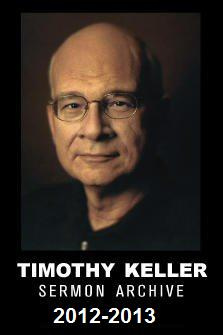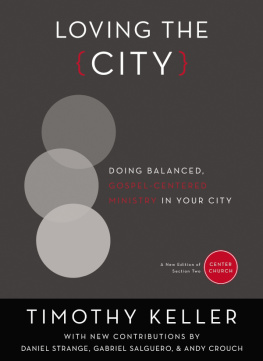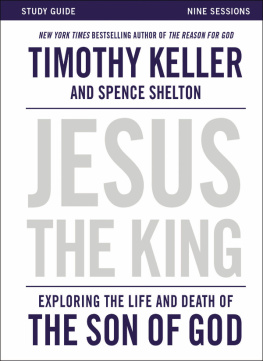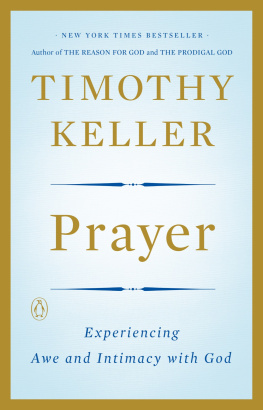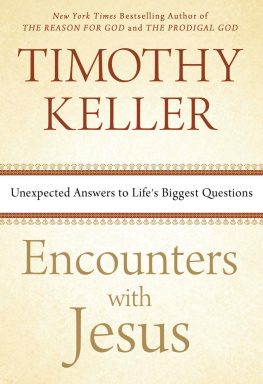The Wedding Party
Also by Timothy Keller
The Reason for God: Belief in an Age of Skepticism
The Prodigal God: Recovering the Heart of the Christian Faith
Counterfeit Gods: The Empty Promises of Money, Sex, and Power, and the Only Hope That Matters
Generous Justice: How Gods Grace Makes Us Just
Kings Cross: The Story of the World in the Life of Jesus
The Meaning of Marriage: Facing the Complexities of Commitment with the Wisdom of God
Center Church: Doing Balanced, Gospel-Centered Ministry in Your City
Every Good Endeavor: Connecting Your Work to Gods Work
The Encounters with Jesus eSeries
The Skeptical Student
The Insider and the Outcast
The Grieving Sisters
The Wedding Party
The Encounters with Jesus Series
IV
Timothy Keller
DUTTON
Published by the Penguin Group
Penguin Group (USA) Inc., 375 Hudson Street,
New York, New York 10014, USA
USA / Canada / UK / Ireland / Australia / New Zealand / India / South Africa / China
Penguin Books Ltd, Registered Offices: 80 Strand, London WC2R 0RL, England
For more information about the Penguin Group visit penguin.com.
Published by Dutton, a member of Penguin Group (USA) Inc.
Copyright 2013 by Timothy Keller
All rights reserved. No part of this book may be reproduced, scanned, or distributed in any printed or electronic form without permission. Please do not participate in or encourage piracy of copyrighted materials in violation of the authors rights. Purchase only authorized editions.
All Bible references are from the New International Version (NIV), unless otherwise noted.
E-book ISBN 978-1-101-61445-7
While the author has made every effort to provide accurate telephone numbers, Internet addresses, and other contact information at the time of publication, neither the publisher nor the author assumes any responsibility for errors or for changes that occur after publication. Further, the publisher does not have any control over and does not assume any responsibility for author or third-party websites or their content.

In December 2012 I started the Encounters with Jesus Series in which I look at the big questions we are all bound to answer in life: Who are we as human beings? What is wrong with us? What, if anything, could improve us? What would put us right? I am beginning with stories from Johns Gospel in which people came literally face to face with answers to these big questions. In the first, The Skeptical Student, we looked at the story of Nathanael, and how his brief encounter with Jesus turned cynicism into belief. In the second, The Insider and the Outcast, we saw that Jesus could deal with different people in very different ways but ultimately helped them see their same need for grace. In the third, The Grieving Sisters, we saw that the famous story of the raising of Lazarus reveals both our deepest needs and Jesus Christs unique ability to address them. The Wedding Party is the fourth entry in this series.
In The Skeptical Student I mentioned Luc Ferrys powerful book A Brief History of Thought, in which he writes that most people have a working philosophy of life and that we tend to be wildly optimistic about how original our particular philosophy is. He says there have been only four or five basic systems of thought in Western history, which form the collective source of our current ideas about how we ought to live. Christianity is one of those systems, and it could be argued that it is the most pervasive one because there is a growing population of over two billion adherents today. If Socrates was rightthat an unexamined life is not worth livingthen, no matter who you are, you need to have a good idea of Christianitys answers to the big life questions. Many people think they know all there is to know about Christianity. But we dont know as much as we think, and thats one of the things I address in this series.
The New Testament Gospel of John contains some of the richest encounters with Jesus ever recorded. We have seen in earlier essays that Jesus came into this world because of its broken and dark condition. But in this essay, I want to think about how Jesus came to put things right. More pointedly, What did Jesus come to do?
This encounter involves a wedding feast. John 2 tells us that Jesus, his mother, and some of his disciples had been invited to a particular banquet in the town of Cana.
Ancient and traditional cultures put far more emphasis on the family and the community than on the individual. Meaning in life was to be found not in individual achievement but in being a good husband or wife, son or daughter, father or mother. The purpose of a marriage was not primarily the happiness of the two individuals but instead to bind the community together and to raise the next generation. In other words, the purpose of marriage was the good of the commonwealth. The bigger, the stronger, and the more numerous the families of a town, the better its economy, the greater the military security, the more everyone flourished.
And this meant that weddings and wedding feasts were simply a far bigger deal than they are today. Each wedding was a public feast for the entire town because marriage was about the whole community, not merely the couple. At the same time, it was also the biggest event in the personal life of both the bride and the groom. This was the day they came of age and became full adult members of their society. It is no surprise, then, that ancient wedding feasts went on for daysa week at least.
And with this background we are able to see that our text opens abruptly on a great disaster. Perhaps just a day or two into the festivities the family simply ran out of wine, the single most important element in an ancient feast. Essentially, the party was over. This was not a mere breach of etiquette but a social and psychological catastrophe, particularly in a traditional honor-and-shame culture.
This is the occasion for conflict between Jesus and his mother:
On the third day a wedding took place at Cana in Galilee. Jesus mother was there, and Jesus and his disciples had also been invited to the wedding. When the wine was gone, Jesus mother said to him, They have no more wine.
Woman, why do you involve me? Jesus replied. My hour has not yet come.
His mother said to the servants, Do whatever he tells you.
Nearby stood six stone water jars, the kind used by the Jews for ceremonial washing, each holding from twenty to thirty gallons.
Jesus said to the servants, Fill the jars with water; so they filled them to the brim.
Then he told them, Now draw some out and take it to the master of the banquet.
They did so, and the master of the banquet tasted the water that had been turned into wine. He did not realize where it had come from, though the servants who had drawn the water knew. Then he called the bridegroom aside and said, Everyone brings out the choice wine first and then the cheaper wine after the guests have had too much to drink; but you have saved the best till now.
What Jesus did here in Cana of Galilee was the first of the signs through which he revealed his glory; and his disciples believed in him. (John 2:211)




